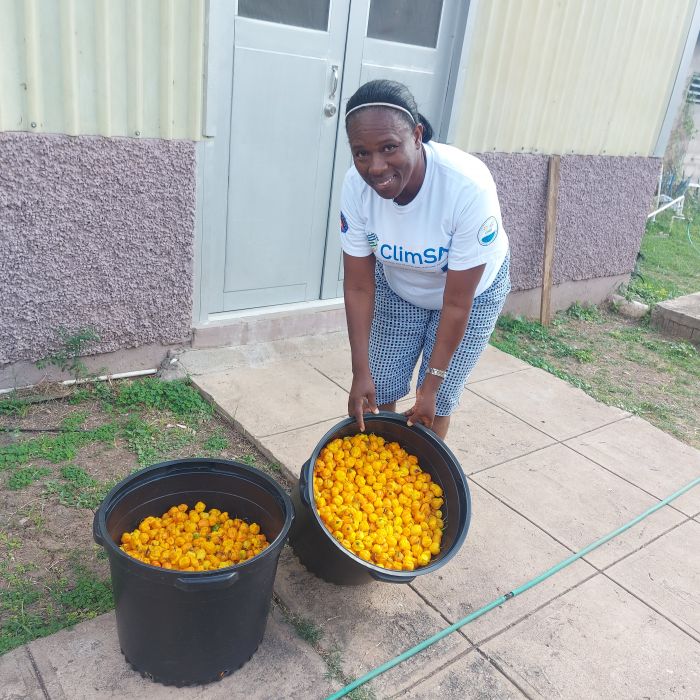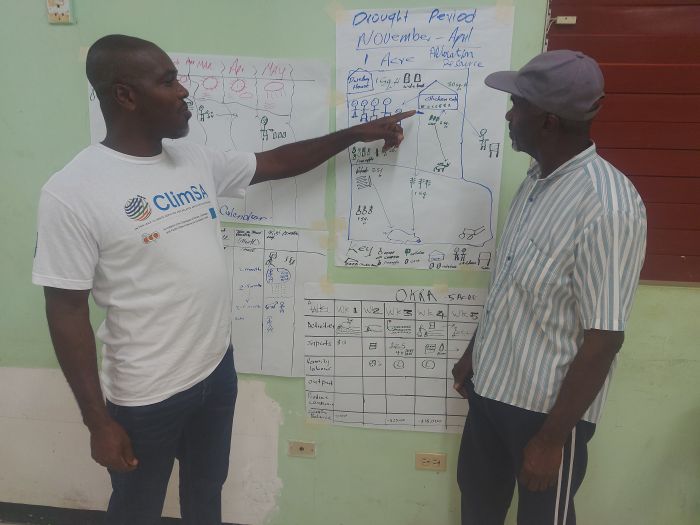November 2023, Jamaica
For residents in the parishes of Clarendon, St Catherine, St Ann, Westmoreland and St Elizabeth in Jamaica, agriculture is the economic backbone on which their lives and livelihoods depend. These industrious men and women produce crops such as bananas, coconuts, and breadfruits for export as well as local consumption. However, climate change, and increased climate variability and extremes are inflicting high levels of economic loss on the sector and those who depend on it for a living.
Florret Caballero, a farmer from Bushy Park, St. Catherine is one such individual. Along with her husband, Florret owns 8-acres of land, 4-acres of which is used for farming. Together the pair produce pumpkin, hot peppers, onion, okra, and cucumber, as well as rear cattle.
Joshoa Dixon, another farmer from the Bushy Park, St. Catherine area, operates a 3.5-acre farm where he single-handedly plants okra, pumpkin, and corn for the local market now that his children have left the nest. Joshoa reveals that farming in Bushy Park is extremely challenging as the dry season stretches from December to May, and on his farm, there was no significant rainfall from November 2022 to February 2023, as Jamaica was experiencing a meteorological drought.
Small farmers like Joshoa and Florret are extremely vulnerable to the impacts of climate change and climate variability which include increased frequency and severity of droughts, and intense rainfall events that can lead to poor yields, crop failure, livestock mortality and pest and disease outbreaks. This reduced agricultural production caused by long-tern climate change and increased climate variability results in less household income for these small farmers which places their well-being, livelihoods, and the country’s food security at risk.
Through support provided by the Intra-ACP Climate Services and Related Applications and Services (ClimSA) Caribbean Programme, in February 2023, Agricultural Extension Officers were trained in the Participatory Integrated Climate Services for Agriculture (PICSA) approach to assist farmers in making on-farm decisions in response to potential climatic conditions. This training was hosted in collaboration between the Caribbean Institute for Meteorology and Hydrology (CIMH), the Jamaica Meteorological Service (JMS), the Rural Agriculture and Development Authority (RADA) of the Jamaica Ministry of Agriculture and Fisheries (MoAF), and the University of Reading.

In a field exercise conducted during this training, extension officers were given the opportunity to put the PICSA approach into practice by engaging and training small farmers like Joshoa and Florret. By participating in this exercise Joshoa and Florret gained a better understanding of the crops, seasons, and farming practices best for their context, and explored the difference between flood and drip irrigation practices. Joshoa was able to identify the preferred irrigation option for his farm. He noted that the flood irrigation technique was not the best utilization of the limited water resource available as it resulted in water wastage. Therefore, the drip irrigation system would be better suited to his farm. Similarly, Florret intends to modify the irrigation practices used on her farm to make it more efficient, minimizing the amount of water loss from evaporation, infiltration, and runoff.
Based on their introduction to the PICSA approach to agriculture, Joshua and Florret intend to invest in, and plant more drought resistant crops, integrating these varieties with the crops they have grown accustomed to planting. Using this and other climate adaptation measures shared during the PICSA field exercise, it is likely that these small farmers stand to benefit from increases in agricultural production. They hope that through continued exposure to the PICSA approach, they will become less vulnerable to the impacts of climate change and climate variability, and better positioned to make informed decisions, reduce risk, and build resilience on their farms.
Through the Intra-ACP ClimSA Caribbean Programme, the CIMH will monitor and provide periodic reports on the progress of farmers like Florret, and Joshoa, who are engaged in the PICSA approach, as they advance towards the adoption of climate-smart agriculture strategies.
The Intra-ACP ClimSA Caribbean Programme is supported by the global Intra-ACP ClimSA Programme, an initiative funded by the European Union (EU). This programme aims to improve the production, access to and use of climate information, services, and applications to support evidence-based decision-making across African, Caribbean, and Pacific states.


